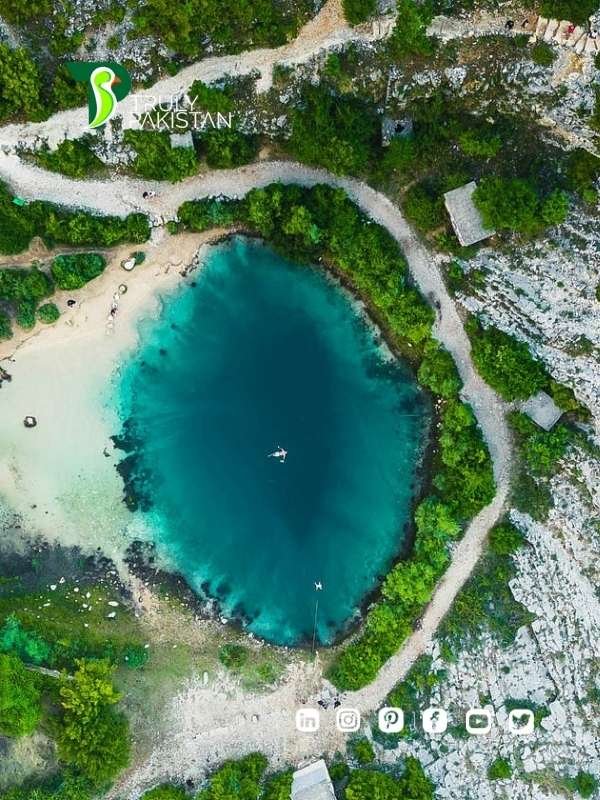Ansoo Jheel Pakistan: Complete Travel and Trekking Guide
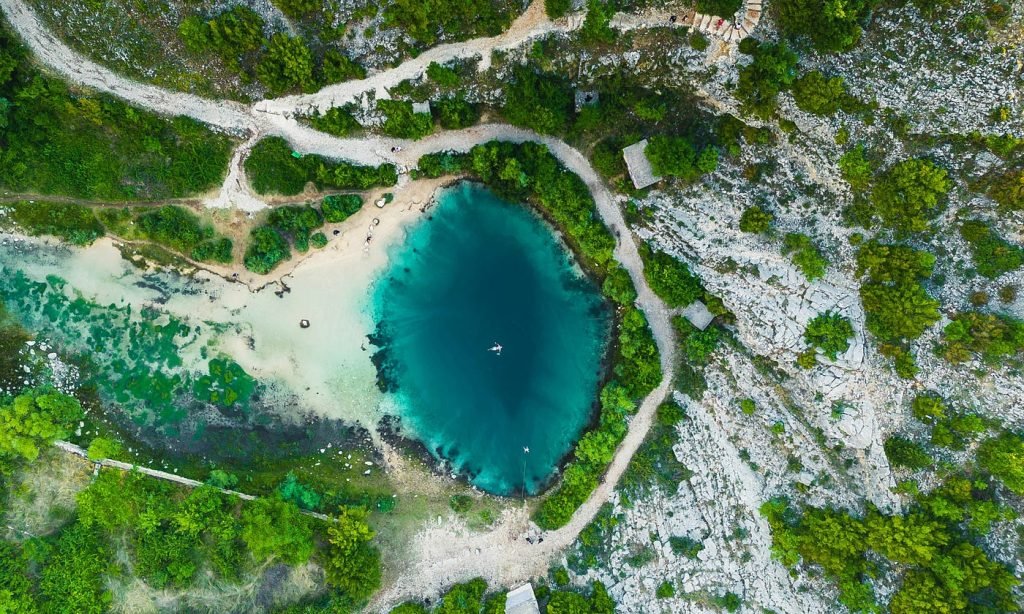

High in the Kaghan Valley of Khyber Pakhtunkhwa sits Ansoo Jheel, the tear shaped alpine lake near Malika Parbat. Most visitors reach it from Saif ul Malook on a demanding full day trek, or from Manoor Valley on a longer approach. Plan for July and August for the best chance of clear views, carry warm layers even in summer, and start before sunrise to complete the round trip safely.
Typical trekking time is 7 to 9 hours for the Saif ul Malook route with strong fitness, while the Manoor Valley route often splits over two days with a night at Dher meadows. If you want the quick summary, go in mid summer, begin early, hire a local guide if you are new to altitude, and turn back if fog rolls in by midday.
What is Ansoo Jheel Pakistan
Location and Altitude of Ansoo Jheel Pakistan
Ansoo Jheel lies in Mansehra District in the Kaghan Valley of northern Pakistan. The lake sits above 4,100 meters, often listed at about 4,126 meters, with some guides rounding to 4,245 meters. The setting is stark and beautiful, with rock and snow fields below Malika Parbat. Weather shifts quickly at this height, so visitors should expect cold wind, bright sun, and sudden cloud within the same hour.
History and Discovery of the Tear Drop Lake
The lake became widely known after Pakistan Air Force pilots saw it during a training flight in 1993. Local herders and trekkers in the valley knew of it earlier, but the aerial sighting drew national attention. The Urdu word ansoo means tear, a nod to the lake’s teardrop outline when viewed from a vantage above the shore.
Trekking to Ansoo Jheel Pakistan
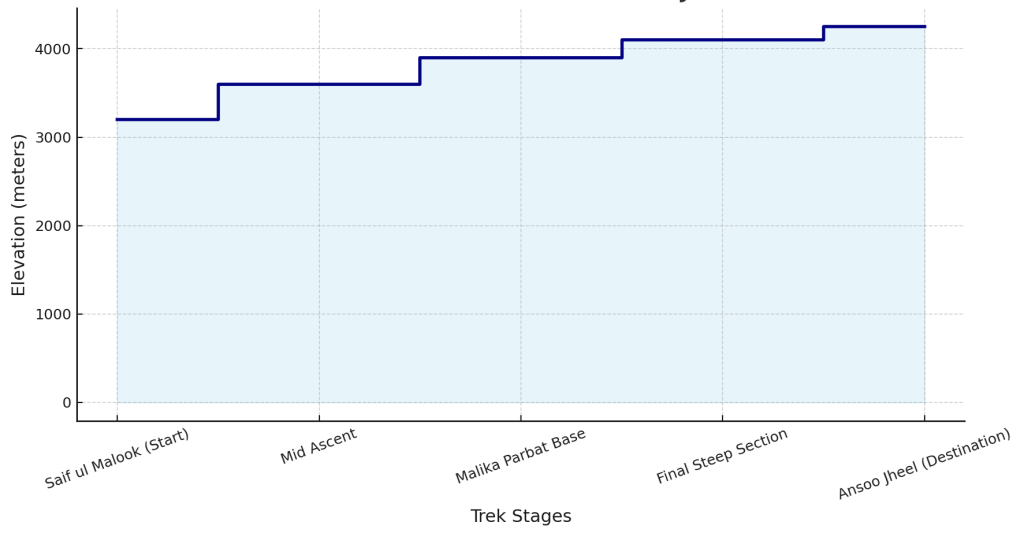

Route from Saif ul Malook Lake to Ansoo Jheel Pakistan
This is the most common day push. Take a jeep from Naran to Saif ul Malook very early, then begin the hike at first light. The path climbs steadily over rocky terrain toward the base of Malika Parbat. Expect snow patches early in the season and scree near the top. A fit group that moves efficiently can reach the lake in 3.5 to 4.5 hours, spend a short viewing window at the rim, then return to Saif ul Malook by late afternoon.
- Start time, before sunrise for safer snow and better visibility
- Water and food, carry at least 2 to 3 liters per person plus high energy snacks
- Clothing, warm mid layer, shell jacket, hat and gloves, UV protection
- Pacing, short rests every 30 to 40 minutes to manage altitude
- Turn back time, if cloud builds or you are behind schedule by midday
Alternative Route via Manoor Valley to Ansoo Jheel Pakistan
This route begins from Mahandri toward Manoor Valley, then on to Dher meadows. Many trekkers plan one night at Dher to break the ascent. The final climb to the lake is still steep near the rim, but the overall gradient feels more gradual compared to the Saif ul Malook push. Choose this route if you prefer a slower acclimatization and a meadow campsite experience.
- Day 1, Mahandri to Manoor Valley to Dher meadows, set camp or stay in a basic hut if available
- Day 2, Early start from Dher to Ansoo Jheel, return to Dher, then continue to Manoor or stay a second night
Trekking Difficulty and Duration for Ansoo Jheel Pakistan
Both approaches require strong legs, steady pace, and comfort on uneven ground. The Saif ul Malook route is an advanced day hike because of altitude and time on feet. Expect 7 to 9 hours round trip for trained hikers and longer for cautious pace. The Manoor Valley version suits those who prefer to split the climb and enjoy meadows, with total trail time spread over two days. Elevation gain Significant, with steep sections near the rim Surface Rock, scree, snow patches in early season Risk factors Rapid weather change, low visibility, cold wind, fatigue at altitude
Guides, Horses, and Local Support near Ansoo Jheel Pakistan
Local guides from Naran or Saif ul Malook help with route finding and pace control. Horses may be hired on parts of the approach, which can assist with load carrying, although the final rim section usually requires hiking on foot. Confirm prices, route plan, and turn back conditions before departure. Hire guides who carry a basic first aid kit and who are familiar with current snow conditions.
Best Time to Visit Ansoo Jheel Pakistan
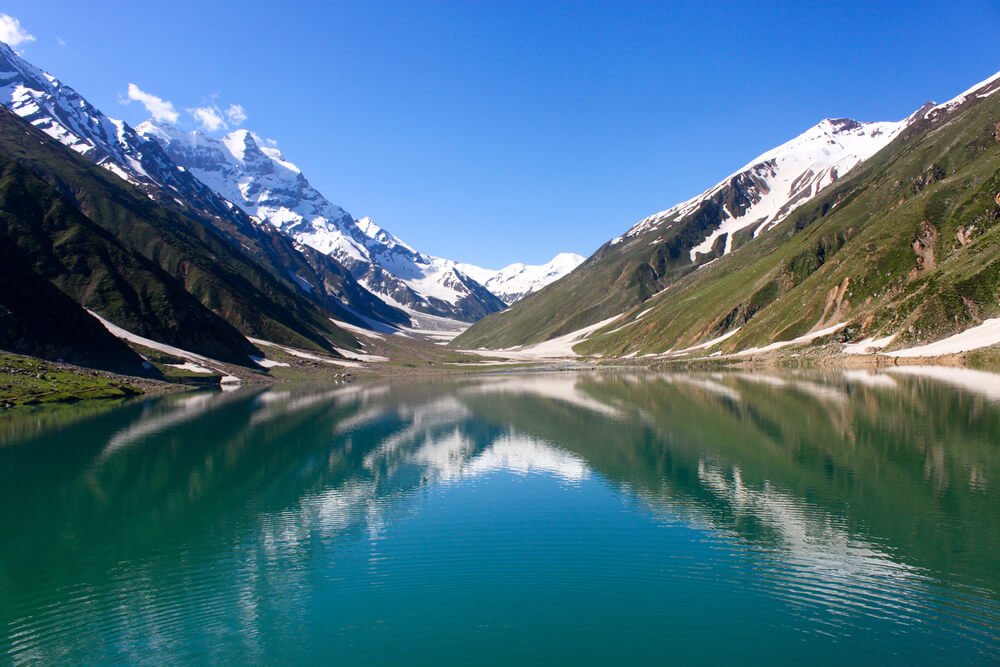

Weather and Seasonal Changes at Ansoo Jheel Pakistan
The lake remains frozen for much of the year. The clearest viewing window generally falls in July and August when snow recedes and the water opens. Even then, midday fog can hide the lake for hours. The most reliable views often appear in the morning. Rain or light snow may occur without warning, so waterproof layers and a pack cover are essential.
Safety Precautions During Trekking Season for Ansoo Jheel Pakistan
- Acclimatize in Naran for a day if you are new to altitude
- Begin early to avoid afternoon cloud and to keep a buffer for return time
- Carry navigation basics, offline map, headlamp, whistle, and a small first aid kit
- Set a firm turn back time, usually around midday if visibility is poor
- Drink and eat regularly, small sips and frequent snacks work best at altitude
Advanced Tips for Ansoo Jheel Pakistan
Visibility Strategy for Ansoo Jheel Pakistan
Plan to reach the rim in the morning when cloud cover is usually thinner. If fog blocks the view, wait ten to twenty minutes to catch a clear window. Keep warm while waiting and avoid standing still on wet rock. If visibility does not improve by the set turn back time, begin the descent to stay safe.
- Check recent route updates from local guides in Naran
- Carry sunglasses for glare and a buff for wind chill
- Keep your pack light but include a warm mid layer and a rain shell
Nutrition and Hydration Plan at Ansoo Jheel Pakistan
Eat small amounts every hour to maintain energy. Combine a slow burn snack, such as nuts, with quick sugars, such as dates. Sip water often. Many trekkers under drink in cold wind, so set reminders. If you feel light headed or develop a headache that does not ease with rest and water, consider turning back.
Route Comparison for Ansoo Jheel Pakistan
| Aspect | Saif ul Malook Route | Manoor Valley Route |
|---|---|---|
| Style | Single long day for strong hikers | Two day plan with a night at Dher meadows |
| Gradient | Steeper near the rim with scree | More gradual overall, still steep near the top |
| Logistics | Jeep to Saif ul Malook, early start, clear turn back time | Jeep to Mahandri, approach through Manoor, campsite setup |
| Who should pick it | Fit groups used to high altitude day pushes | Trekkers who prefer slower acclimatization and meadow camping |
Mini Case Study, Two Trekkers at Ansoo Jheel Pakistan
Amna and Bilal began from Saif ul Malook at 5, reached the rim at 9, and met rolling fog. They waited fifteen minutes and got a three minute opening to see the full teardrop shape. They left the rim by 9:30 to stay within their timeline and were back by mid afternoon. Their success came from an early start, steady pacing, and a firm turn back rule.
FAQ on Ansoo Jheel Pakistan
What makes Ansoo Jheel Pakistan special
It is a high alpine glacial lake with a natural teardrop outline beside Malika Parbat. The shape, the elevation, and the short viewing season make it rare and memorable.
How to reach Ansoo Jheel Pakistan from Naran
Go by jeep to Saif ul Malook, start hiking before sunrise, and follow the trail toward the base of Malika Parbat. Keep to visible paths and ask local guides about current snow or scree conditions. For a slower option, use Mahandri to Manoor Valley to Dher meadows, then climb to the lake the next morning.
When is the best time to visit Ansoo Jheel Pakistan
July and August offer the best chance of open water and stable footing. Even in season, mornings are usually clearer. Outside this window expect snow cover, ice, and frequent white out conditions.
How difficult is the trek to Ansoo Jheel Pakistan
It is a demanding high altitude hike. The Saif ul Malook route feels like an advanced day push due to elevation gain and time on foot. The Manoor Valley route spreads the effort over two days but still includes a steep final section.
Can beginners trek to Ansoo Jheel Pakistan safely
Beginners with good fitness can attempt it with a local guide, proper layers, and a strict turn back time. Spend a day in Naran to acclimatize, start early, and avoid pushing through fog or fatigue.
Flora, Fauna, and Ecological Importance of Ansoo Jheel Pakistan
Wildlife Around Ansoo Jheel Pakistan
The high alpine zone around Ansoo Jheel Pakistan supports hardy plants, lichens, and seasonal wildflowers. Birdlife includes high elevation species that ride thermals above the ridges. You may also notice marmot calls in meadows along the approach. Keep distance, use a quiet voice, and leave no food traces so wildlife behavior stays natural.
Environmental Concerns and Conservation at Ansoo Jheel Pakistan
Trail erosion, litter, and off path shortcuts damage fragile ground. Pack out all waste, including tissues and snack wrappers. Stay on visible paths, step on rock where possible, and avoid trampling alpine plants. If you hike with a group, keep numbers small, agree on a single line, and follow a local guide who understands seasonal ground conditions.
Folklore and Cultural Significance of Ansoo Jheel Pakistan
Origin of the Name for Ansoo Jheel Pakistan
Ansoo means tear in Urdu. From a higher point near the rim, the lake outline resembles a teardrop with a small outlet channel that looks like a falling tear. This simple image, combined with the remote setting, gives the place a quiet, reflective mood that many visitors remember years later.
Local Tales and Myths of Ansoo Jheel Pakistan
Valley stories describe the lake as a sign of longing, a natural symbol set beside Malika Parbat. While versions differ by village, the common thread is respect for the mountain and weather. Use these stories as a reminder to move with care, listen to your guide, and accept the mountain’s mood on the day.
Practical Travel Tips for Ansoo Jheel Pakistan
Essential Gear and Trek Preparation for Ansoo Jheel Pakistan
- Footwear, broken in trekking shoes with good grip
- Clothing, warm mid layer, wind and rain shell, hat, light gloves
- Sun care, sunglasses and high SPF sunscreen, the glare is strong at altitude
- Navigation, offline map and a headlamp with fresh batteries
- Energy, 2 to 3 liters of water per person, plus nuts, dates, and simple carbs
- Emergency, small first aid kit, blister care, whistle, and a charged phone
Accommodation and Stay Options for Ansoo Jheel Pakistan
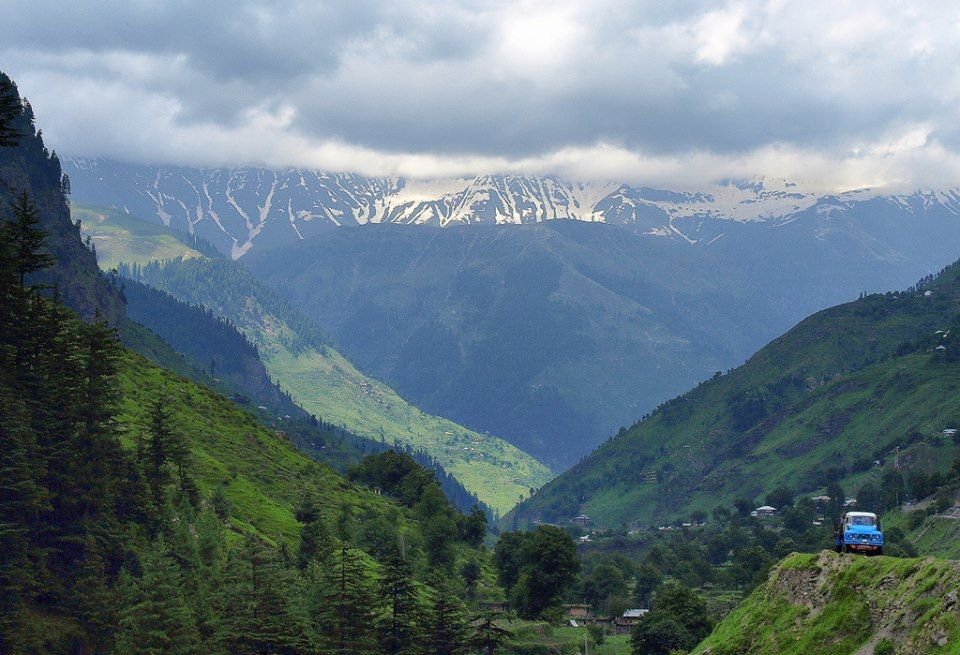

Base yourself in Naran for access to Saif ul Malook. For the Manoor Valley route, plan a simple stay at Dher meadows if available, or camp with a local guide. Confirm availability before departure since facilities change with the season and weather.
Responsible Tourism Guidelines for Ansoo Jheel Pakistan
- Hire local guides and porters, this supports valley livelihoods
- Carry reusable bottles, avoid single use plastics
- Pack out all trash, leave no trace around the rim or meadows
- Respect prayer times and local customs in nearby villages
- Share trail space, give uphill hikers the right of way
Conclusion
Ansoo Jheel Pakistan rewards careful planning, a strong early start, and patient timing at the rim. If you keep a steady pace, watch the weather, and respect the fragile ground, you will improve your odds of seeing the full teardrop shape in a clear window. Ready to turn your plan into action, line up a local guide, check conditions the day before, and keep your group light and flexible.
Plan your trek with TrulyPakistan, explore more Pakistan travel guides
About the Author
Author: ZunNurain Khalid — Travel & Tourism Specialist, Founder of ExploreX Pvt. Ltd., and advocate for sustainable tourism in Pakistan. With over a decade of experience in digital marketing and destination branding, ZunNurain has worked extensively on promoting Pakistan’s natural and cultural heritage.

